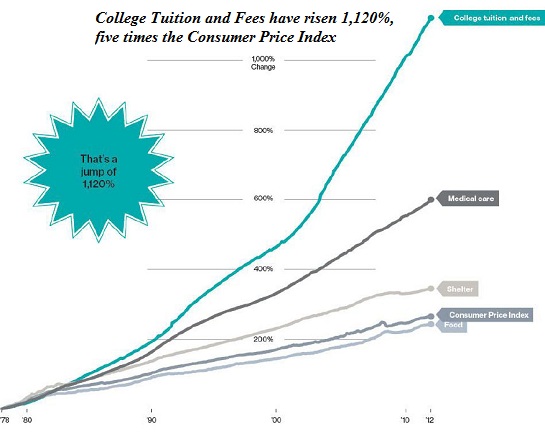Short, intense directed apprenticeships that teach students how to learn on their own to mastery are the future of higher education.
So it turns out sitting in a chair for four years doesn't deliver mastery in anything but the acquisition of staggering student-loan debt. Practical (i.e. useful) mastery requires not just hours of practice but directed deep learning via doing of the sort you only get in an apprenticeship.
The failure of our model of largely passive learning and rote practice is explained by Daniel Coyle in his book The Talent Code (sent to me by Ron G.), which upends the notion that talent is a genetic gift. It isn't--in his words, it's grown by deep practice, the ignition of motivation and master coaching.
Using these techniques, student reach levels of accomplishment in months that surpass those of students who spent years in hyper-costly conventional education programs. The potential to radically improve our higher education system while reducing the cost of that education by 90% is the topic of my books Get a Job, Build a Real Career and Defy a Bewildering Economy and The Nearly Free University and the Emerging Economy: The Revolution in Higher Education.
Let's start by admitting our system of higher education is unsustainable and broken: a complete failure by any reasonable, objective standard. Tuition has soared $1,100% while the output of the system (the economic/educational value of a college degree) has declined precipitously.
A recent major study, Academically Adrift: Limited Learning on College Campuses, concluded that "American higher education is characterized by limited or no learning for a large proportion of students."
'Academically Adrift': The News Gets Worse and Worse (The Chronicle of Higher Education)
These two charts are the acme of unsustainability: college tuition has skyrocketed, along with federally funded student loan debt.


The typical graduate of a short, intense directed apprenticeship says "I learned more in a month here than I did in four years of college." This is a statement of fact, and it is the result of the methods deployed in structured on-the-job training.
It is a fact that passively listening to a lecture does not generate the sort of mastery that creates economic value or the sort of deep understanding that is the goal of a classic liberal arts education.
It's also a fact that rote practice also doesn't lead to mastery, and often kills the very passion for a subject that in more productive programs jumpstarts mastery.
Our higher educational system has failed so badly that many students are incapable of writing/communicating effectively. In a world of rapidly changing technologies across every field and an emerging economy that places an ever-higher premium on collaboration and clear communication across multiple time zones and languages, the ability to write clearly is absolutely essential.
To "graduate" students with poor writing skills is completely unforgivable. Yet in the current system, if a student logs the requisite number of credits, a diploma is duly issued, regardless of how little he/she actually learned.
Here's a six-month program that could replace four years of hyper-costly, ineffective university.
1. Teach the students how to learn on their own, for the rest of their lives. This could take as little as a few hours or days. Once a student learns how to pursue deep learning and deep practice on their own, they don't need years of classrooms--they just need the guidance of someone experienced in the field, i.e. a structured apprenticeship.
2. One semester in a wide variety of on-the-job experiences. Once students are given real experience in a variety of fields and industries, it's likely some spark of ignition will occur and they'll find the motivation to pursue real mastery instead of a worthless credential.
3. Directed apprenticeships plus online lectures/workshops by the best lecturers viewed before or after the students' real work. The key to learning deeply and learning fast is to push right up against the current level of competence, where failure occurs and can be addressed one piece at a time.
Interestingly, Coyle notes that the most successful incubators of talent around the world are generally in makeshift or decrepit buildings, not fancy new gleaming buildings of the sort that dot American college campuses. Surrounded by luxury, who feels any hunger to learn anything voraciously?
The entire "campus experience" should be jettisoned, not just as an overly expensive infrastructure but as a detriment to fast, deep learning that is the foundation of mastery.
It isn't that hard to teach students how to improve their writing/communications skills very quickly, and give them a taste of the classic liberal arts education so many people claim is the goal of $120,000 four-year programs that fail to generate a deep understanding of anything remotely leading to mastery.
Give them a single sentence by Melville, Austin, et al. and have them compose a sentence that is like the original in cadence, structure and meaning in one minute flat. Go, go, go. Then break down each phrase and each component and work through each one to improve their first efforts, step by step. Repeat the process, always under intense time pressure.
Then take them out into the real world to report a journalistic story by interviewing people, checking facts, confirming quotes from sources, question the received wisdom around the topic and compose the story in journalistic style. Once again, break down their efforts line by line in comparison with a professional journalists' story on the same topic.
Then, in the second class... more doing the work at a breakneck pace, more being pushed beyond their current level of expertise, more corrections of errors and weaknesses, step by step, in a pressure-cooker of deadlines.
I can pretty much guarantee the students in such a directed apprenticeship will learn more about writing in a week than they would in a year of conventional coursework.
Short, intense directed apprenticeships that teach students how to learn on their own to mastery are the future of higher education. We can continue to squander trillions of dollars on an ineffective system until it finally collapses under its own weight, or we can admit the current contraption is unsustainable and a failure, and move on to a better, cheaper system.
A Radically Beneficial World: Automation, Technology and Creating Jobs for All is now available as an Audible audio book.
A Radically Beneficial World: Automation, Technology and Creating Jobs for All is now available as an Audible audio book.
My new book is #2 on Kindle short reads -> politics and social science: Why Our Status Quo Failed and Is Beyond Reform ($3.95 Kindle ebook, $8.95 print edition)For more, please visit the book's website.
NOTE: Contributions/subscriptions are acknowledged in the order received. Your name and email remain confidential and will not be given to any other individual, company or agency.
Thank you, Lance D. ($5/month), for your outstandingly generous re-subscription to this site-- I am greatly honored by your steadfast support and readership.
|
